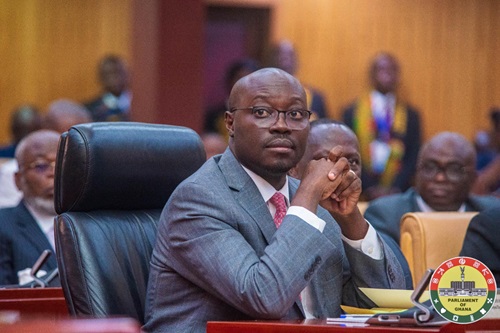
Mid-year budget review missed opportunity to abolish taxes - Minority asserts
The Minority in Parliament has expressed disappointment at the failure of the Minister of Finance to remove some of the “burdensome taxes making Ghana unattractive for investment” when he presented the mid-year fiscal policy review of the Budget Statement and Economic Policy of the government yesterday.
It said at the very least, Ghanaians expected Dr Mohammed Amin Adam to have removed or abolished a number of taxes that had made Ghana a high-tax regime that was causing businesses and the average Ghanaian to leave the shores of the country.
The Minority, for instance, cited some of the taxes that could have been removed as the COVID levy, E-levy, sanitation levy, tax on domestic electricity, emission levy, betting tax, high import duties, and more than 40 other taxes.
“Mr Speaker, this is a missed opportunity; instead, the minister, bereft of ideas, did not announce one single new policy and introduce new ideas,” the Minority Leader, Dr Cassiel Ato Forson, said.
Commenting on the fiscal policy review of the budget, Dr Ato Forson said: “These burdensome taxes have made Ghana unattractive for investment.
“Ghana has lost so many job opportunities as a result of the relocation of businesses,” he said.
Unbearable conditions
The Minority Leader said it appeared that since the New Patriotic Party (NPP) assumed power eight years ago, it became evident yesterday that the Ghanaian economy had been on autopilot.
That, he said, gave no hope to the ordinary Ghanaian that anything would be done to change the unbearable hardship that confronted the people of Ghana.
Dr Forson said given the high import duties and levies at the country’s ports in addition to existing high unemployment prevailing in the country, Ghana was no longer attractive or a gateway to West Africa.
“Our ports, particularly the Tema Port, has lost almost 50 per cent of its traffic with further job losses. “Living in Ghana is now exceedingly difficult as the cost of living has become unbearable,” he said.
New arrears
The MP for Ajumako Enyan Esiam told the House that he was shocked to have noticed that Appendix 2A on page 107 of the minister’s Mid-Year Review Budget revealed that the government had missed the IMF programme target already.
Referring to the arrears clearance in the address, Dr Ato Forson said the government had gone against the dictates of the IMF programme by accumulating new arrears worth $4.5 billion.
“Mr Speaker, in the original budget, this government has programmed zero for the first half of the year; meanwhile, in Appendix 2A of the mid-year budget review, they have actually incurred arrears worth $4.5 billion,” he said.
He said it indicated that many Ghanaians were currently unable to put food on the table for their families and loved ones, adding that “people cannot simply make ends meet”.
“High food prices are one of the major problems facing Ghana today, and yet this mid-year review did not provide a roadmap to arrest the escalating food prices. “Planting for Food and Jobs was a monumental failure despite the billions of Ghana cedis that have been spent (on it) so far,” he said.
He added that the greatest threat to the country’s national security today was youth unemployment and food insecurity. Those two factors, he said, were fuelling the loss of confidence in Ghana’s democracy as revealed in the recent Afrobarometer report on Ghana.
“The Akufo-Addo and Bawumia government will be remembered as the government that left behind a bankrupt economy, default economy, haircut economy, debt-riddled economy, an over-taxed economy, high inflationary economy, high food inflation economy and high monetary policy rate economy,” he said.
Improved conditions
Earlier, the Majority Leader, Alexander Afenyo-Markin, highlighted some of the major interventions contained in the Finance Minister’s address. For instance, he said, the School Feeding Programme, which was previously being patronised by 1.6 million Ghanaian children, was now being enjoyed by four million children.
He also stated that GH¢6.5 billion had been allocated for the National Health Insurance Scheme as compared with GH¢1.2 billion in 2016 by the previous government.
“Mr Speaker, as of 2016 when the previous government left office and they could not perform, it was just GH¢49 million that they spent on the Livelihood Empowerment Against Poverty.
“But today, the government is spending GH¢423 million to cover many of our vulnerable (people),” the Majority Leader said.
